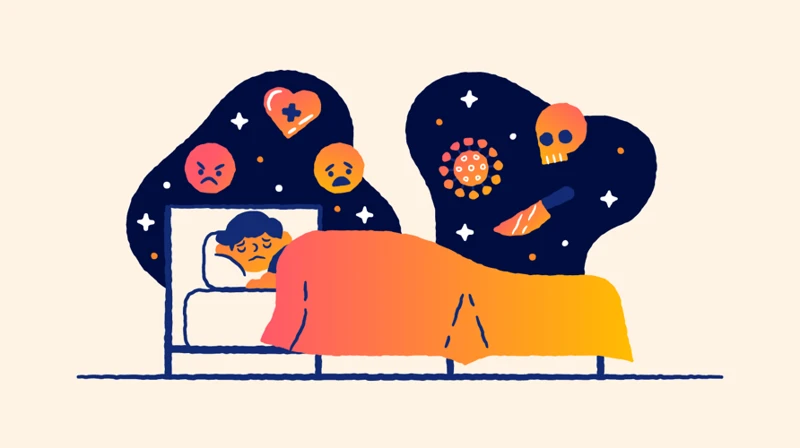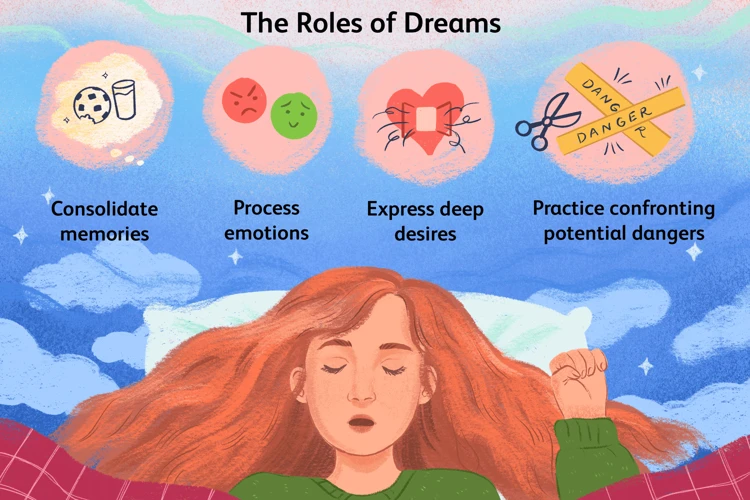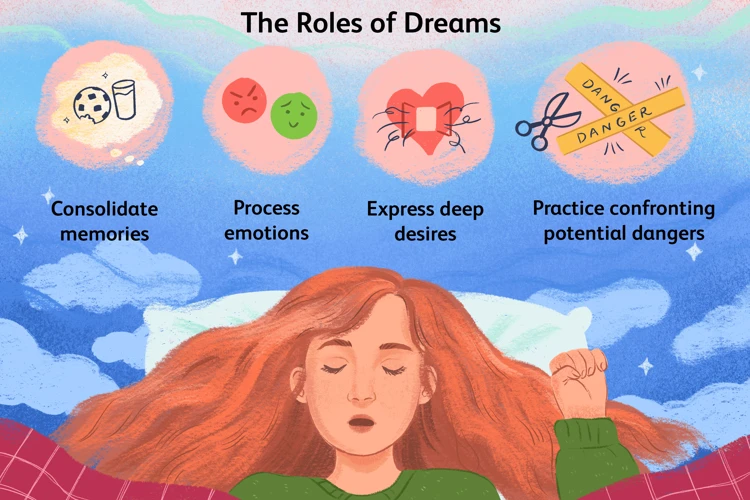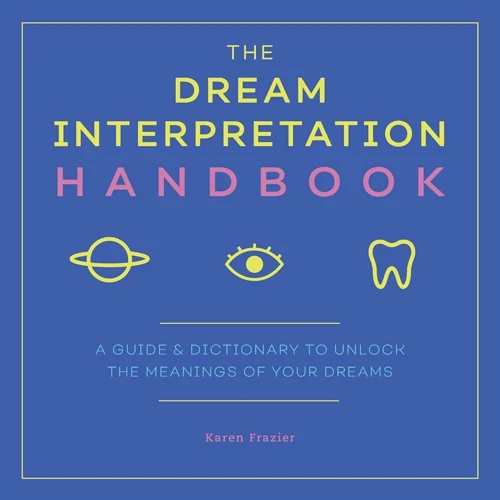Do your nights often leave you feeling drained and unsettled? Are vivid and distressing dreams haunting your sleep? While nightmares are commonly associated with children, they can also affect adults, often leaving them feeling shaken and anxious. These unsettling nighttime experiences can be more than just a product of an overactive imagination; they may be closely intertwined with the stress we experience in our waking lives. In this article, we will explore the intricate connection between nightmares and stress, delving into the psychological and physiological factors that contribute to their link. By understanding this connection, we can gain insight into the potential impact on our mental and emotional well-being, as well as explore strategies for coping effectively with these unsettling nocturnal experiences.
The Nature of Nightmares

Nightmares, with their vivid and unsettling imagery, have long captured our curiosity and perplexed our minds. These nocturnal experiences go beyond ordinary dreams, bringing forth intense feelings of fear, terror, and unease. Defined as highly distressing dreams that awaken the sleeper, nightmares can leave a lasting impact on our emotional well-being. While nightmares can vary widely in content and theme, there are certain common themes that tend to recur. These themes may include falling, being chased, experiencing physical harm, or facing supernatural entities. These distressing dreams often leave us feeling overwhelmed and questioning their significance. Exploring the symbolism and deeper meanings behind nightmares can shed light on our subconscious fears and worries, providing valuable insights into our emotional landscape and helping us navigate our waking lives more effectively.
Definition of Nightmares
- Nightmares are vivid and distressing dreams: Nightmares are a type of dream characterized by their highly vivid, intense, and distressing nature. Unlike regular dreams, nightmares elicit strong emotional responses, often involving fear, terror, and unease. These dreams can be so vivid and lifelike that upon waking, individuals may struggle to differentiate between the dream and their reality.
- They cause the sleeper to awaken: One defining characteristic of nightmares is that they have the power to awaken the sleeper from their sleep. This abrupt awakening can contribute to feelings of disorientation and lingering anxiety upon waking. The intensity of these dreams can sometimes lead to physical responses such as rapid heartbeat, sweating, and shortness of breath.
- Recurrent or frequent occurrence: While occasional nightmares are normal, the presence of recurrent or frequent nightmares may indicate an underlying issue. These repetitive nightmares, whether centered around a specific theme or not, can disrupt sleep patterns and have a significant impact on overall sleep quality and well-being.
- Distress and impairment: Nightmares are not just fleeting bad dreams; they often cause significant distress and impairment in daily functioning. The emotional toll of these distressing dreams can affect mood, concentration, and overall mental well-being. Individuals who frequently experience nightmares may find themselves avoiding sleep or experiencing anxiety about falling asleep.
Understanding the definition of nightmares allows us to identify and validate these unsettling experiences. By recognizing the impact they have on our sleep and emotional well-being, we can begin to explore ways to mitigate their frequency and intensity, promoting better sleep quality and overall mental health.
Common Themes in Nightmares
Nightmares can encompass a wide range of terrifying scenarios, but certain themes tend to recur across individuals. These common themes reflect deep-rooted fears and anxieties that may be present in our subconscious mind. Here are some of the prevalent themes found in nightmares:
1. Falling: One of the most common nightmares involves the sensation of falling from a great height. This theme may symbolize a lack of control or a fear of losing stability in one’s life. The sense of helplessness and vulnerability can evoke intense emotions during the dream.
2. Being Chased: Many people experience nightmares where they are being pursued by an unknown assailant or a terrifying creature. This theme often represents an avoidance of confronting an issue or an ongoing fear that is haunting the individual’s waking life.
3. Physical Harm: Nightmares filled with violence, accidents, or physical harm can reflect a deep-seated fear of injury or vulnerability. These dreams may be triggered by real-life traumatic experiences or a heightened sense of insecurity.
4. Supernatural Encounters: Dreaming of encounters with ghosts, monsters, or supernatural entities is a common nightmare theme. These dreams may symbolize repressed emotions, unresolved conflicts, or psychological distress that needs to be addressed.
5. Being Trapped: Feeling trapped or unable to escape is a recurring nightmare theme that can elicit feelings of claustrophobia and anxiety. This theme could represent a fear of being stuck in a challenging situation or an inability to break free from emotional or mental constraints.
Understanding these common themes can provide valuable insights into the underlying fears and concerns that contribute to the occurrence of nightmares. Exploring the symbolism and analyzing the subconscious meanings behind these themes can help individuals decipher their own personal narratives and gain a deeper understanding of their innermost thoughts and fears. For more information on exploring the symbolism in nightmares, consider reading our article: Exploring Symbolism in Nightmares.
Understanding Stress

Stress is an inherent part of our lives, affecting us both physically and mentally. It is a complex response to external pressures, demands, or challenges that we encounter on a daily basis. This response triggers a cascade of physiological and psychological reactions in our bodies, preparing us to cope with perceived threats or changes. Stress can arise from various sources, including work, relationships, financial pressures, or major life events. When we experience prolonged or excessive stress, it can have detrimental effects on our overall well-being. The impact of stress on our bodies and minds is far-reaching, contributing to sleep disturbances, impaired immune function, mood disorders, and much more. Understanding the nature of stress is crucial in uncovering its connection to nightmares and how it can influence the quality of our sleep and mental health.
Definition of Stress
Stress, a ubiquitous and multifaceted concept, plays a significant role in our daily lives. In the context of nightmares, understanding the definition of stress becomes crucial. Stress can be defined as the body’s response to external and internal demands that exceed our ability to cope effectively. It is a physiological and psychological reaction that occurs when we perceive a situation as challenging, threatening, or overwhelming. When exposed to stressors such as work pressures, relationship difficulties, financial strain, or major life changes, our bodies release stress hormones like cortisol and adrenaline, activating the “fight or flight” response. This response prepares our bodies to deal with perceived threats, but prolonged or chronic exposure to stressors can have detrimental effects on our overall well-being, including our sleep quality. It is important to note that stress is subjective and individuals may react differently to various stressors, making it a highly individualized experience. Understanding the definition of stress provides a foundation for exploring its impact on our mental and physical health, as well as its connection to the occurrence and intensity of nightmares.Nightmares and sleep quality can be heavily influenced by the stress we encounter, creating a complex interplay between our nighttime experiences and our waking stress levels.
The Impact of Stress on the Body and Mind
Chronic stress has profound effects on both the body and mind, triggering a cascade of physiological and psychological responses. When we experience stress, the body’s natural stress response, commonly known as the “fight-or-flight” response, is activated. This response releases stress hormones such as cortisol and adrenaline, preparing the body to face potential threats. However, when stress becomes chronic, these hormones can wreak havoc on our well-being.
Physically, long-term exposure to stress hormones can lead to a variety of health issues. These may include increased blood pressure, elevated heart rate, suppressed immune function, and disrupted sleep patterns. The constant state of hyperarousal caused by stress can also contribute to muscle tension, headaches, digestive problems, and even cardiovascular disorders.
The impact of stress on the mind is equally significant. Chronic stress can impair cognitive function, leading to difficulty concentrating, memory problems, and decreased mental flexibility. It can also contribute to the development or exacerbation of mental health conditions such as anxiety and depression. The constant state of heightened alertness and the overwhelming nature of stress can contribute to feelings of overwhelm, irritability, and a general sense of being on edge.
Stress can disrupt sleep patterns, leading to inadequate rest and an increased susceptibility to experiencing nightmares. The link between stress and nightmares becomes particularly evident when considering that stress and anxiety can cause our minds to become preoccupied with negative thoughts and worries, which may manifest as disturbing dream imagery during sleep.
Understanding the impact of stress on both the body and mind is crucial in recognizing the potential role it plays in the development and intensity of nightmares. By managing stress levels and implementing strategies to promote relaxation and self-care, we can potentially minimize the occurrence and severity of nightmares, leading to improved overall well-being.
The Link Between Nightmares and Stress

Nightmares and stress are intricately connected, with each influencing and amplifying the other’s impact. Nightmares can be seen as manifestations of stress, reflecting the anxieties and conflicts that we experience in our daily lives. When we are under significant stress, our minds often struggle to process and regulate emotions effectively, leading to an increased likelihood of experiencing distressing dreams during sleep. The frequency and intensity of nightmares are also closely tied to stress levels. Studies have shown that individuals who experience chronic stress are more prone to frequent and intense nightmares. This bidirectional relationship between nightmares and stress creates a vicious cycle, where nightmares contribute to increased stress levels, which in turn exacerbates nightmare occurrence. Understanding this connection can help us recognize the role that stress plays in our sleep disturbances and provide valuable insights into managing both nightmares and stress effectively. Exploring the symbolism and deeper meanings behind nightmares can further enhance our understanding of the intricate link between nightmares and stress.
Nightmares as Manifestations of Stress
- Nightmares as reflections of internal turmoil: Nightmares can often be seen as manifestations of inner turmoil and psychological distress. When we experience high levels of stress, our emotions and anxieties may find their way into our dreams, creating unsettling and vivid scenarios. These nightmares may serve as outlets for repressed feelings, allowing us to process and confront our fears in a symbolic way.
- Emotional arousal and nightmares: Stress can significantly impact our emotional well-being and disrupt the natural sleep cycle. When we are stressed, our bodies release stress hormones such as cortisol, which can increase emotional arousal and make us more susceptible to nightmares. These intense emotions can fuel the vivid and distressing nature of nightmares, leading to heightened fear and anxiety upon waking.
- Insomnia and nightmares: The relationship between stress, insomnia, and nightmares is often intertwined. Stress can disrupt our sleep patterns, making it difficult to achieve restful sleep. Insomnia, in turn, can increase the likelihood of experiencing nightmares. When our sleep is disrupted, we may spend more time in REM sleep—the stage of sleep most closely associated with dreaming. This extended time in REM sleep can lead to an increase in the frequency and intensity of nightmares.
- Recurring nightmares and chronic stress: Chronic stress can have a lasting impact on our well-being, including our dream patterns. When stress becomes a prolonged and ongoing part of our lives, it can contribute to recurring nightmares. These recurring nightmares may be related to specific stressors or traumatic experiences, causing them to resurface in our dreams on a regular basis.
The Role of Stress in Nightmare Frequency and Intensity
- Nightmare Frequency: Stress has been found to significantly impact the frequency of nightmares. When we are under high levels of stress, our brains are in a hyperactive state, making it more likely for distressing dreams to occur at night. Research suggests that individuals who experience chronic stress are more prone to recurrent nightmares, often experiencing them multiple times a week. The heightened emotional arousal and anxiety associated with stress create fertile ground for the manifestation of nightmares, increasing their frequency.
- Nightmare Intensity: Along with frequency, stress also plays a role in the intensity of nightmares. Stress activates the body’s fight-or-flight response, triggering the release of stress hormones such as cortisol and adrenaline. These hormones can heighten emotional reactivity and amplify feelings of fear and anxiety during sleep. As a result, nightmares experienced during times of stress may be more vivid, emotionally charged, and terrifying. The intensity of nightmares can further contribute to disrupted sleep, waking the individual feeling exhausted and distressed.
The relationship between stress and nightmares is a complex one. While stress can contribute to the occurrence and intensity of nightmares, it’s important to note that nightmares can also be influenced by a variety of other factors such as underlying mental health conditions, medication use, and sleep disorders. By addressing and managing stress levels, individuals may find relief from the burden of frequent and intense nightmares, promoting better overall sleep and well-being.
Psychological Perspective

Understanding nightmares from a psychological perspective allows us to delve into the intricate workings of the mind and explore the hidden layers of our subconscious. Psychoanalytic interpretations, notably Sigmund Freud’s theories, posit that nightmares are symbolic representations of repressed thoughts, desires, or unresolved conflicts. According to Freud, these distressing dreams serve as a way for our unconscious mind to express and process these hidden emotions and wishes. On the other hand, cognitive-behavioral approaches view nightmares as a result of faulty thinking patterns and maladaptive behaviors. These perspectives emphasize the role of cognitive distortions, such as catastrophizing or negative self-talk, in generating and perpetuating nightmares. By analyzing and addressing these psychological factors, individuals can gain valuable insights and learn effective coping strategies to alleviate the frequency and intensity of their nightmares, promoting better sleep and overall well-being.
Psychoanalytic Interpretations of Nightmares
In the realm of dream analysis, psychoanalytic interpretations offer intriguing insights into the meaning and significance of nightmares. According to Sigmund Freud, the renowned father of psychoanalysis, nightmares are symbolic representations of repressed desires and unresolved psychological conflicts. Freud believed that dreams, including nightmares, served as a pathway to the unconscious mind, acting as an outlet for unexpressed emotions and unfulfilled wishes.
From a psychoanalytic perspective, nightmares can be seen as manifestations of our deepest fears, traumas, and unresolved childhood experiences. They provide a symbolic language through which the unconscious mind communicates its hidden desires and anxieties. By unraveling the symbolism within nightmares, psychoanalysts strive to uncover the hidden meanings behind the distressing imagery.
For example, falling in a nightmare can be interpreted as a representation of feeling out of control or experiencing a loss of power in waking life. Being chased may symbolize the avoidance of a deeply buried fear or the feeling of being pursued by unresolved past events. Understanding these symbolic interpretations can provide individuals with valuable insights into their subconscious emotions and help them uncover and address the underlying psychological conflicts that may be contributing to the prevalence of nightmares.
It is important to note that while psychoanalytic interpretations offer one perspective on nightmares, they are not without their critiques. Some researchers argue that not all nightmares can be easily explained through Freudian theory and that alternative frameworks, such as cognitive-behavioral approaches, may provide a more comprehensive understanding of these nocturnal experiences.
Psychoanalytic interpretations of nightmares delve deep into the unconscious mind, exploring the symbolism and hidden meanings behind these vivid and distressing dreams. By unraveling the psychological messages embedded within nightmares, individuals can gain insight into their innermost fears and untapped desires, potentially leading to personal growth and healing.
Cognitive-Behavioral Approaches to Nightmares
When it comes to addressing nightmares, cognitive-behavioral approaches have shown promise in helping individuals regain control over their sleep and reduce the frequency and intensity of distressing dreams. These therapeutic techniques focus on identifying and challenging negative thought patterns and beliefs that contribute to the development and maintenance of nightmares. One widely used approach is cognitive restructuring, which involves examining and modifying distorted thoughts that fuel anxiety or fear associated with nightmares. By replacing irrational and negative thoughts with more realistic and balanced ones, individuals can reframe their perception of their nightmares and reduce the emotional distress they experience.
Another technique employed in cognitive-behavioral approaches is exposure therapy, which involves gradually exposing individuals to the content or themes of their nightmares in a safe and controlled environment. This exposure, done either through imagery or in vivo, allows individuals to confront their fears and anxieties associated with the nightmares. Over time, through repeated exposure and the application of relaxation techniques, individuals can desensitize themselves to the distressing elements of their nightmares and develop a sense of mastery and control.
Additionally, cognitive-behavioral approaches often incorporate the use of coping skills, such as relaxation exercises, deep breathing techniques, and imagery rehearsal therapy. These strategies help individuals manage their anxiety and stress levels, which in turn can have a positive impact on nightmares. By practicing relaxation techniques before bed and developing a pre-sleep routine that promotes a sense of calm and safety, individuals can create a more conducive environment for restful sleep and minimize the occurrence of nightmares.
It’s important to note that cognitive-behavioral approaches to nightmares are typically delivered by trained mental health professionals. They may be used in conjunction with other therapeutic interventions, such as medication or sleep hygiene techniques, to provide a comprehensive and tailored treatment plan. If you are experiencing significant distress due to nightmares, it is advisable to seek the guidance of a qualified therapist who can help you navigate these approaches and work towards a better quality of sleep and overall well-being.
Physiological Factors

When it comes to the connection between nightmares and stress, physiological factors play a significant role. Neurochemicals, such as serotonin and norepinephrine, have been found to influence both the occurrence of nightmares and our stress response. Imbalances in these neurotransmitters can disrupt our sleep patterns and contribute to the intensity and frequency of nightmares. Additionally, certain sleep disorders, such as sleep apnea and insomnia, can further exacerbate the nightmare-stress connection. Sleep disruptions caused by these disorders can lead to heightened stress levels, making us more susceptible to experiencing nightmares. Understanding the physiological mechanisms at play can help us recognize the intricate interplay between our body and mind, highlighting the importance of addressing both the physical and psychological aspects of nightmares and stress for effective management and relief.
The Role of Neurochemicals in Nightmares and Stress
Neurochemicals play a crucial role in the intricate connection between nightmares and stress. The brain releases various neurotransmitters and hormones that can influence our dream patterns and emotional states during sleep. One key neurochemical involved in nightmares is norepinephrine, which is released in response to stress. Increased levels of norepinephrine can heighten arousal and contribute to the intensity and vividness of nightmares. Additionally, low levels of serotonin, a neurotransmitter responsible for regulating mood and emotions, have been linked to increased dream activity, including nightmares.
The stress response itself also involves the release of stress hormones, such as cortisol. These hormones can disrupt normal sleep patterns and increase the likelihood of experiencing nightmares. The activation of the body’s stress response system, known as the hypothalamic-pituitary-adrenal (HPA) axis, can lead to a dysregulation of sleep cycles and contribute to the occurrence of distressing dreams.
The interaction between neurochemicals and sleep disorders can further exacerbate the connection between nightmares and stress. Conditions such as sleep apnea, insomnia, and restless leg syndrome can disrupt the sleep cycle and increase the likelihood of experiencing nightmares. Sleep disorders can alter the balance of neurotransmitters and hormones, creating an environment that is conducive to more frequent and intense nightmares.
Understanding the role of neurochemicals in nightmares and stress can provide insight into the physiological mechanisms underlying these experiences. By addressing the imbalances and dysregulations within the brain and body, interventions and treatments can be designed to alleviate the impact of nightmares and promote healthier sleep patterns.
The Influence of Sleep Disorders on Nightmare-Stress Connection
Sleep disorders, such as insomnia, sleep apnea, and restless leg syndrome, can significantly influence the connection between nightmares and stress. These disorders disrupt the normal sleep cycle, leading to fragmented sleep and frequent awakenings throughout the night. The resulting sleep deprivation and altered sleep architecture can contribute to increased emotional reactivity and heightened stress levels. Sleep disorders can also disrupt the regulation of neurotransmitters and hormones involved in the sleep-wake cycle, further exacerbating the link between nightmares and stress. For example, sleep apnea, characterized by repeated pauses in breathing during sleep, can lead to oxygen deprivation and fragmented sleep, increasing the likelihood of nightmares. Similarly, insomnia, which involves difficulty falling asleep or staying asleep, can result in heightened arousal and anxiety, creating fertile ground for the emergence of distressing dreams. The profound impact of sleep disorders on the nightmare-stress connection underscores the importance of addressing and treating these underlying sleep disturbances in order to alleviate the burden of both nightmares and stress on overall well-being.
| Common Sleep Disorders: | Influence on Nightmare-Stress Connection: |
| Insomnia | Heightened arousal and anxiety, increased emotional reactivity |
| Sleep Apnea | Oxygen deprivation, fragmented sleep, increased likelihood of nightmares |
| Restless Leg Syndrome | Disrupted sleep, heightened irritability and stress |
Emotional Regulation and Coping Mechanisms

Emotional regulation and coping mechanisms play a crucial role in managing the frequency and intensity of nightmares in relation to stress. When we experience ongoing stress in our lives, our emotional well-being can be greatly affected, making us more susceptible to distressing dreams. Developing effective coping strategies can help mitigate the impact of stress on our sleep and overall mental health. Coping mechanisms can vary from person to person, but some common approaches include relaxation techniques such as deep breathing exercises or mindfulness meditation, engaging in regular physical exercise to reduce stress levels, and practicing good sleep hygiene. Additionally, exploring cognitive techniques like cognitive-behavioral therapy (CBT) can help reframe negative thought patterns and beliefs related to nightmares and stress. By actively engaging in these coping mechanisms, we can enhance our emotional resilience, regulate our emotions more effectively, and potentially decrease the occurrence of distressing dreams.
Impact of Coping Strategies on Nightmare Frequency and Intensity
Impact of Coping Strategies on Nightmare Frequency and Intensity: Coping strategies play a crucial role in managing nightmares and their associated stress. How we respond to and cope with these distressing dreams can significantly impact their frequency and intensity. One effective strategy is maintaining a consistent sleep schedule and promoting a relaxing bedtime routine. This can include activities such as reading a book, practicing deep breathing exercises, or listening to calming music. Engaging in relaxation techniques, such as meditation or progressive muscle relaxation, before sleep can help reduce stress levels and promote a sense of calmness, potentially minimizing the occurrence of nightmares.
Another important coping strategy is incorporating stress reduction techniques into daily life. This may involve engaging in regular physical exercise, which not only helps alleviate stress but also improves overall sleep quality. Additionally, seeking support from loved ones or participating in support groups can provide a valuable outlet for processing and managing the emotional impact of nightmares.
In some cases, therapy may be necessary to address persistent and distressing nightmares. One evidence-based therapeutic approach is imagery rehearsal therapy (IRT), which involves modifying the content and outcome of nightmares through visualization exercises. This technique helps individuals regain a sense of control and reduce the associated distress. Other therapeutic interventions such as cognitive behavioral therapy (CBT) and eye movement desensitization and reprocessing (EMDR) have also shown promising results in reducing nightmare frequency and intensity.
It is worth noting that the effectiveness of coping strategies may vary for each individual, and a combination of techniques may be necessary to find the most effective approach. Learning to manage stress and develop healthy coping mechanisms can have a positive impact on both the frequency and intensity of nightmares, ultimately improving overall sleep quality and well-being.
Exploring Cognitive Techniques for Nightmares and Stress Management
Cognitive techniques offer effective strategies for managing nightmares and the underlying stress that contributes to their occurrence. One such technique is cognitive restructuring, which involves identifying and challenging negative thoughts and beliefs associated with the nightmares. By examining the irrational thinking patterns that fuel our distressing dreams, we can replace them with more rational and positive thoughts. This process helps to reframe our perception and interpretation of the nightmares, reducing their intensity and emotional impact.
Another cognitive technique is imagery rehearsal therapy (IRT), which focuses on rewriting the script of the nightmare. During this therapy, individuals are encouraged to visualize a new, more positive ending to their recurring nightmare. By repeatedly rehearsing this revised imagery during wakefulness, it becomes ingrained in the subconscious mind and can reshape the dream itself. IRT has shown promising results in decreasing nightmare frequency and improving sleep quality.
Mindfulness-based cognitive therapy (MBCT) is another effective technique that combines cognitive strategies with mindfulness practices. By cultivating present-moment awareness and non-judgmental acceptance, individuals can develop a compassionate and detached perspective towards their nightmares. This allows for a reduction in emotional reactivity and distress when confronted with these intense dream experiences.
Additionally, cognitive techniques can be complemented by relaxation exercises such as deep breathing, progressive muscle relaxation, and guided imagery. These techniques promote relaxation and stress reduction, making it easier to fall back asleep after a nightmare and improve overall sleep quality.
It is important to note that while cognitive techniques can be helpful in managing nightmares and stress, it is advisable to seek guidance from a mental health professional for personalized treatment. They can provide further insights, support, and recommendations tailored to individual needs, ensuring the most effective outcomes in nightmare and stress management.
Consequences and Impacts

The cumulative effect of nightmares and stress on our mental health should not be underestimated. While nightmares themselves can be distressing, their frequent occurrence and intensity can have significant consequences. Chronic nightmares can disrupt the quality of our sleep, leading to chronic fatigue, daytime drowsiness, and decreased cognitive functioning. The emotional toll of nightmares can manifest as increased anxiety, depression, and difficulty in managing stress. The impact of nightmares extends beyond the realm of sleep, affecting our daily functioning and overall quality of life. The fear of experiencing nightmares can lead to sleep avoidance or anxiety around bedtime, further exacerbating sleep disturbances. This vicious cycle of heightened stress, disrupted sleep, and emotional turmoil can ultimately take a toll on our well-being, highlighting the importance of seeking support and developing effective coping strategies to alleviate the negative impacts of nightmares and stress.
The Cumulative Effect of Nightmares and Stress on Mental Health
The cumulative effect of nightmares and stress on mental health can be substantial and should not be underestimated. Both nightmares and stress have individual impacts on our well-being, but when combined, their effects can be even more pronounced. Nightmares that occur frequently and are associated with significant distress can lead to an increased risk of developing mental health disorders such as anxiety and depression. The chronic stress experienced during wakeful hours can intensify the frequency and intensity of nightmares, creating a vicious cycle that perpetuates negative mental health outcomes. The intrusive and disruptive nature of nightmares can result in sleep disturbances, leading to decreased sleep quality and overall functioning. Additionally, the emotional toll of nightmares, along with the ongoing stress experienced during the day, can contribute to heightened levels of anxiety, irritability, and emotional dysregulation. This can further impact daily functioning, relationships, and overall quality of life. Recognizing the cumulative effect of nightmares and stress on mental health is crucial in order to seek appropriate support and interventions to address these interconnected issues.
Implications for Daily Functioning and Quality of Life
The impact of nightmares and stress on daily functioning and overall quality of life cannot be understated. The distress and lingering emotions that follow a nightmare can spill over into the waking hours, affecting various aspects of our lives. One of the primary implications is disrupted sleep patterns, leading to daytime fatigue, difficulty concentrating, and decreased productivity. The fear of experiencing another nightmare can often lead to sleep avoidance and anxiety surrounding bedtime. This, in turn, perpetuates a cycle of poor sleep quality and heightened stress levels. Additionally, the emotional toll of nightmares can affect one’s mood and emotional well-being throughout the day, potentially leading to irritability, anxiety, and even depression. The fear and anxiety related to the content of nightmares can also influence daily decision-making and behavior, as individuals may avoid situations or triggers associated with their traumatic dreams. Social relationships may suffer as well, as the emotional and psychological distress caused by nightmares can make it challenging to connect with others and engage in social activities. The combined impact of these factors can significantly compromise one’s overall quality of life, affecting work, personal relationships, and general enjoyment of daily activities. It is crucial for individuals experiencing frequent nightmares and stress to seek support and effective treatment to mitigate these implications and restore a sense of well-being and normalcy.
Support and Treatment
When nightmares and stress begin to take a toll on our mental well-being, seeking professional support can be crucial for finding relief and developing effective coping strategies. It is important to remember that we are not alone in our struggles, and there are trained professionals who can provide guidance and assistance. Psychologists and therapists specializing in sleep disorders, trauma, and anxiety can offer valuable insights into the root causes of nightmares and stress, helping individuals gain a better understanding of their experiences. Evidence-based interventions and therapeutic approaches, such as cognitive-behavioral therapy (CBT) and eye movement desensitization and reprocessing (EMDR), may be recommended to address the underlying factors contributing to nightmares and stress. CBT techniques, including image rehearsal therapy (IRT), can help individuals actively change the content and emotional intensity of nightmares, allowing for better sleep quality and reducing the impact of stress on sleep. Additionally, lifestyle modifications, relaxation techniques, and sleep hygiene practices can also play a crucial role in managing nightmares and reducing stress levels. Remember, seeking support is a brave step towards reclaiming restful nights and restoring a sense of well-being.
Seeking Professional Support for Nightmares and Stress
- Consulting a therapist: One of the most effective ways to address nightmares and stress is by seeking professional support from a therapist or counselor. These mental health professionals specialize in understanding the intricate relationship between our thoughts, emotions, and behaviors. Through therapy sessions, they can help individuals explore the root causes of their nightmares and identify underlying sources of stress. Additionally, therapists can provide guidance and support in developing coping strategies and relaxation techniques to manage both nightmares and stress effectively.
- Psychotherapy: Psychotherapy, or talk therapy, can be of great benefit for those struggling with nightmares and stress. Various therapeutic approaches, such as cognitive-behavioral therapy (CBT) and psychodynamic therapy, can help individuals gain insight into their thoughts, emotions, and behaviors that contribute to both issues. CBT, for example, focuses on identifying and challenging negative thought patterns and behaviors, helping individuals develop healthier coping mechanisms and reduce the intensity and frequency of nightmares. Psychodynamic therapy, on the other hand, delves into the unconscious mind, exploring the underlying causes and meanings behind nightmares and stress, ultimately facilitating healing and growth.
- Medication: In some cases, a healthcare provider may consider prescribing medication to help manage nightmares and alleviate stress-related symptoms. Certain antidepressant and anti-anxiety medications can help regulate neurotransmitters in the brain, potentially reducing the occurrence and intensity of nightmares. However, medication should always be discussed with a healthcare professional, as it is not a standalone solution and should be used in conjunction with other therapeutic interventions.
- Support groups: Joining a support group can provide individuals with a sense of community and understanding. Interacting with others who share similar experiences can be immensely helpful in processing and coping with nightmares and stress. Support groups offer a safe space to share fears, insights, and practical strategies for managing both issues. These groups can be found through mental health organizations, community centers, or even online forums.
Evidence-Based Interventions and Therapeutic Approaches
When it comes to addressing the connection between nightmares and stress, there are various evidence-based interventions and therapeutic approaches available that can provide relief and support. These interventions are backed by research and have shown promising results in helping individuals manage and reduce the frequency and intensity of nightmares, as well as alleviate the underlying stress contributing to these nighttime disturbances. Some of the commonly used interventions include:
1. Cognitive-Behavioral Therapy for Insomnia (CBT-I): CBT-I is a therapeutic approach specifically designed to address sleep-related difficulties, including nightmares. This therapy involves identifying and challenging negative thought patterns and beliefs that may contribute to sleep disturbances. Through techniques such as stimulus control, sleep restriction, and cognitive restructuring, individuals can learn to establish healthy sleep habits and reduce the impact of nightmares on their overall sleep quality.
2. Imagery Rehearsal Therapy (IRT): IRT is a technique that focuses on modifying and reshaping the content of nightmares. It involves rewriting the script of the nightmare, changing the outcome or introducing alternative positive imagery. By practicing this new version of the nightmare during wakefulness, individuals can reduce the emotional distress associated with the original dream and potentially decrease its frequency or intensity.
3. Relaxation Techniques: Various relaxation techniques, such as progressive muscle relaxation, deep breathing exercises, and mindfulness meditation, can help individuals manage stress, promote relaxation, and improve sleep quality. These practices can be incorporated into a bedtime routine to create a calm and peaceful environment conducive to better sleep and decreased nightmare occurrence.
4. Pharmacological Interventions: In some cases, when nightmares and stress are significantly impacting an individual’s well-being, medication may be considered as part of the treatment plan. Certain medications, such as selective serotonin reuptake inhibitors (SSRIs), may be prescribed to help regulate sleep patterns and decrease the occurrence of nightmares. It is important to consult with a healthcare professional to evaluate the potential benefits and risks of medication intervention.
While these interventions and approaches have shown promise in addressing nightmares and stress, it is essential to work with a qualified healthcare professional or therapist who can tailor the treatment plan to meet individual needs. Additionally, combining these therapeutic approaches with self-care practices, such as maintaining a regular sleep schedule, engaging in physical activity, and practicing stress management techniques, can further enhance the overall effectiveness of the interventions and contribute to improving sleep quality and reducing the impact of nightmares on daily functioning.
Wrapping Up the Connection
The complex connection between nightmares and stress has significant implications for our mental health and overall well-being. As we have explored, nightmares can serve as manifestations of underlying stress or trauma, reflecting our anxieties and fears. The frequency and intensity of nightmares are often linked to the level of stress we experience in our daily lives, acting as a barometer of our emotional state. Managing stress levels and developing effective coping mechanisms are crucial in reducing the occurrence and impact of nightmares.
From a psychological perspective, psychoanalytic interpretations offer insights into the deeper meanings and symbolism behind nightmares. Uncovering and addressing the underlying issues can help alleviate the distress associated with these dreams. Cognitive-behavioral approaches focus on changing negative thought patterns and behaviors that contribute to nightmare occurrence, promoting healthier sleep patterns and reducing distress.
Physiological factors, such as neurochemicals and sleep disorders, also play a role in the nightmare-stress connection. Imbalances in neurotransmitters, such as serotonin and norepinephrine, can affect sleep patterns and contribute to the occurrence of nightmares. Additionally, sleep disorders like insomnia and sleep apnea can disrupt the sleep cycle and increase the likelihood of experiencing distressing dreams.
Effective emotional regulation and coping mechanisms are instrumental in managing nightmares and associated stress. Adopting healthy coping strategies, such as relaxation techniques, journaling, and engaging in creative outlets, can help reduce the frequency and intensity of nightmares. Cognitive techniques, such as imagery rehearsal therapy and lucid dreaming, empower individuals to actively participate in shaping their dream experiences and promoting more positive outcomes.
The cumulative effect of nightmares and stress on mental health cannot be underestimated. Prolonged exposure to nightmares and chronic stress can contribute to the development of mental health disorders, including anxiety and depression. These conditions can significantly impact daily functioning and quality of life. Seeking professional support for nightmares and stress is essential in addressing these issues and preventing any further deterioration of mental well-being.
Evidence-based interventions and therapeutic approaches are available to help individuals effectively manage nightmares and stress. These may include cognitive-behavioral therapy (CBT), eye movement desensitization and reprocessing (EMDR), and medication management, depending on the underlying causes and severity of the symptoms. Working with a qualified mental health professional can provide guidance and support in overcoming the challenges associated with nightmares and stress.
The intricate connection between nightmares and stress highlights the importance of understanding and addressing these experiences to protect our mental and emotional well-being. By unraveling the underlying causes, exploring therapeutic interventions, and adopting healthy coping strategies, individuals can regain control over their sleep and enjoy a more peaceful and restorative nocturnal experience.
Frequently Asked Questions
What causes nightmares?
Nightmares can be caused by a variety of factors, including stress, anxiety, trauma, medication side effects, sleep disorders, and even certain foods. Understanding the underlying cause of your nightmares can help in developing effective strategies for prevention and management.
Are nightmares a sign of mental illness?
While nightmares can be distressing, they are not necessarily indicative of mental illness on their own. However, frequent and intense nightmares may be associated with certain mental health conditions such as PTSD, anxiety disorders, or depression. Consulting with a mental health professional can provide further clarity and support.
Can nightmares have long-term effects?
Yes, recurring nightmares and chronic sleep disturbance can have long-term effects on mental health and overall well-being. They may contribute to increased anxiety, disrupted sleep patterns, and poor quality of life. Seeking appropriate support and treatment can help alleviate the impact of nightmares and improve overall sleep health.
How can stress contribute to nightmares?
Stress can disrupt the normal sleep cycle and trigger nightmares. When we experience heightened stress levels, our brains may process and consolidate distressing memories or anxieties during sleep, resulting in nightmares.
Can medication cause nightmares?
Yes, certain medications, such as antidepressants, beta blockers, and some sleep aids, have been associated with an increased risk of nightmares. If you suspect that your medication might be causing nightmares, it is essential to consult with your healthcare provider for further evaluation and potential adjustments.
Should I wake someone up from a nightmare?
It is generally recommended to approach someone gently and calmly if they are experiencing a nightmare. While you may want to wake them up, it is important to prioritize their safety and well-being. Offering comfort and reassurance when they wake up can help alleviate the distress caused by the nightmare.
Can recurring nightmares be treated?
Yes, recurring nightmares can be effectively treated. Techniques such as image rehearsal therapy, cognitive-behavioral therapy, and relaxation exercises have shown promising results in reducing nightmare frequency and intensity. Seeking professional guidance from a therapist specializing in sleep disorders can be beneficial.
Is it possible to prevent nightmares?
While it is not always possible to prevent nightmares entirely, there are strategies that may help reduce their occurrence. Engaging in stress-reducing activities, establishing a relaxing bedtime routine, maintaining a consistent sleep schedule, and creating a comfortable sleep environment can all contribute to a better night’s sleep with fewer nightmares.
Do recurring nightmares have any meaning?
Recurring nightmares can hold personal meanings and symbolize unresolved emotions, fears, or traumatic experiences. Exploring the themes, symbols, and emotions in recurring nightmares with the help of a therapist or counselor can provide valuable insights into the subconscious mind and aid in the process of addressing and resolving underlying issues.
What role does sleep quality play in nightmares?
Poor sleep quality, characterized by frequent awakenings or disruptions throughout the night, can contribute to the occurrence and intensity of nightmares. Addressing underlying sleep disorders and adopting healthy sleep habits can improve overall sleep quality and potentially reduce the frequency of nightmares.








